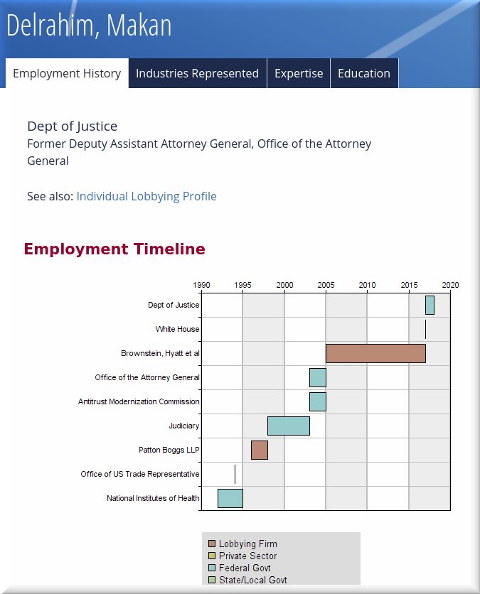
 Reference: Revolving Door: Makan Delrahim Employment Summary
Reference: Revolving Door: Makan Delrahim Employment Summary
PATENTS are about markets and competition. They're about publishing of ideas without risk to one's business. The Japan Patent Office (JPO) seems to understand that patents which cannot be worked around, e.g. because they're essential for standards compliance, are a barrier to markets and competition. These patents can actively damage progress in science and technology -- something which the USPTO proclaims to be promoting.
"The Japan Patent Office (JPO) seems to understand that patents which cannot be worked around, e.g. because they're essential for standards compliance, are a barrier to markets and competition."As we've been noting repeatedly in recent years, Japan's courts got tougher on software patents. It wasn't always the case. Japan's government also gets it better than the Trump administration, where lobbyist Delrahim is now in charge of antitrust matters. The US, which fails to understand the concept of antitrust, would do its industry irreparable damage for the sake of few large corporations (like Qualcomm); Japan is at least recognising the issue with SEP. It is taking action. We last wrote about that a couple of days ago, citing Japenese bloggers.
"Patent owners have little to worry about in JPO plans for SEP reviews," IAM stated yesterday, having published this damage-controlling piece for the patent aggressors/trolls it stands for. To quote:
The Japan Patent Office (JPO) last week unveiled a new service that will see it weigh in on the standing of Japanese patents declared standards essential. When it was first announced last November, this system was perceived as offering a defensive tool to implementers. But the draft guidelines for the scheme, helpfully translated in part here by Satoshi Watanabe of Watanabe Research and Consulting, have foreclosed that possibility.
The essentiality checks fall under an existing programme called Hantei, in which the JPO provides non-binding advisory opinions on whether a particular patent covers a particular product. The service costs just around $400 and issued 97 decisions in 2016. Currently, this review can be requested by either a product manufacturer or a patent owner.
"As we've been noting repeatedly in recent years, Japan's courts got tougher on software patents."Aaric Eisenstein, writing for Watchtroll yesterday, is now publicly sucking up to Iancu, lobbying him to abolish PTAB (as usual from Watchtroll) among other things. Those are some of the same interests as IAM's. Follow the money.
Then there's the Koch-funded think tank for patent trolls (and against PTAB). It now says you "MUST READ" its letter which it describes with: "No empirical study has demonstrated that a patent-owner’s request for injunctive relief after . . . infringement of its property rights has ever resulted either in consumer harm or in slowing down the pace of technological innovation."
"As always, there's that irksome lobby of the patent trolls. It wants to undermine patent policy or tilt things in its favour."Who wrote this? See the list. It's just the patent maximalists' lobby (some funded by the biggest patent bullies, e.g. David Kappos). To quote: "Signatories to the letter include Judge Douglas H. Ginsburg of the D.C. Circuit, former Chief Judge Paul Michel of the Federal Circuit, former FTC Commissioner Joshua D. Wright, and former Director of the U.S. Patent & Trademark Office David Kappos, among others."
IAM promoted this letter some days ago. It's signed by the usual suspects. We know what they want and why they want it. We also know who funds some of them. That's pretty revealing. ⬆